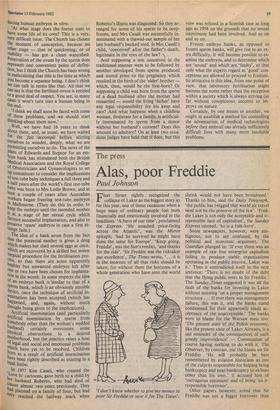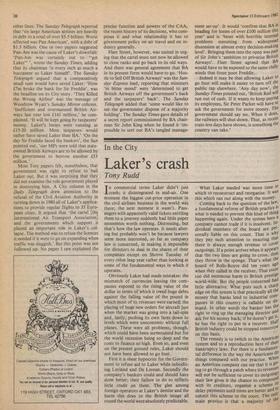The press
Alas, poor Freddie
Paul Johnson
Fleet Street rightly recognised the collapse of Laker as the biggest story so far this year, one of those occasions when a huge mass of ordinary people feel both financially and emotionally involved in the headlines. 'A hero of our time', proclaimed the Express. 'He smashed price-fixing across the Atlantic', was the Mirror epitaph; 'had he survived he might have done the same for Europe'. 'Keep going, Freddie', was the Sun's verdict, 'and thanks for the ride'. 'Sir Freddie was the risktaker par excellence', The Times wrote, ... it is in the interests of all that risks should be taken; for without them the horizons of a whole generation who have seen the world 'I don't know whether to give my money to poor Sir Freddie or save it for The Times'. shrink would not have been broadened.' Thanks to him, said the Daily Telegraph, 'the public has twigged that world air travel need not be the preserve of the few'. 'Fred- die Laker is not only the acceptable and ir- repressible face of capitalism', the Sunday Express intoned, 'he is a folk-hero'.
Some newspapers, however, were am- biguous, not to say confused, by the political and economic argument. The Guardian plunged in: 'If ever there was an example of raw free enterprise capitalism failing to produce stable organisations operating in the public interest, Laker was it.' Then it contradicted itself in the next sentence: 'There is no doubt of the debt that the flying public owes to Sir Freddie.' The Sunday Times suggested it was all the fault of the banks for investing in Laker without insisting 'on a proper management structure . If ever there was management failure, this was it, and the banks stand condemned for their apparently ready ac- ceptance of the unacceptable.' The banks were to blame for the Warsaw mess too: 'The present state of the Polish economy, like the present state of Laker Airways, is a sad reminder of the consequences of such greedy improvidence' — Communism of course having nothing to do with it. The Observer, by contrast, put the blame on Sir Freddie: 'He will probably be best remembered by aviation historians as one of the culprits responsible for helping bring bankruptcy and near-bankruptcy to airlines other than his own.' It accused him of 'outrageous optimism' and of being 'an ir- ' responsible borrower'.
Other papers however, noted that Sir Freddie was not a bigger borrower than
other lines. The Sunday Telegraph reported that 'six large American airlines are heavily in debt to a total of over $3.5 billion. Worst affected was Pan American', with a debt of $1.5 billion. One or two papers suggested Pan-Am was the cause of Laker's downfall: 'Pan-Am was certainly out to "get Laker" ', wrote the Sunday Times, adding that its chairman 'is every inch as much a buccaneer as Laker himself'. The Sunday Telegraph argued that a comparatively small sum would have saved Laker: 'How £7m broke the bank for Sir Freddie', was the headline on its City story. 'They Killed the Wrong Airline' was the message of Woodrow Wyatt's Sunday Mirror column. 'Inefficient and overmanned British Air- ways last year lost £141 million,' he com- plained. 'It will be kept going by taxpayers' money. Laker's losses were running at £15-20 million. Most taxpayers would rather have saved Laker than BA.' On the day Sir Freddie faced the bankers', the Sun pointed out, 'our MPs were told that state- owned British Airways are to be allowed by the government to borrow another £53 million.'
Most Tory papers felt, nonetheless, that government was right to refuse to bail Laker out. But it was surprising that they did not examine the role government played in destroying him, A City column in the Daily Telegraph drew attention to the refusal of the Civil Aviation Authority in turning down in 1980 all of Laker's applica- tions to provide regular flights to 35 Euro- pean cities. It argued that 'the cartel [the International Air Transport Association] and the governments which support it played an important role in Laker's col- lapse. The method was to refuse the licences it needed if it were to go on expanding when traffic was sluggish.' But this point was not followed up. No paper I saw explained the
precise function and powers of the CAA, the recent history of its decisions, who com- poses it and what relationship it has to gOvernment policy on air travel and on in- dustry generally.
Fleet Street, however, was united in urg- ing that the cartel must not now be allowed to close ranks and go back to its old ways. And there was general agreement that BA in its present form would have to go. 'Hus- tle to Sell Off British Airways' was the Sun- day Express lead, reporting that ministers 'in bitter mood' were 'determined to get British Airways off the government's back and the taxpayers' back'. The Sunday Telegraph added that 'some would like to see the government dispose of a majority holding'. The Sunday Times gave details of a secret report commissioned by BA chair- man Sir John King when he found it `im- possible to sort out BA's tangled manage-
ment set-up'. It would 'confirm that BA is heading for losses of over £100 million this year' and is 'beset with horrible internal problems stemming from widespread dissension at almost every decision-making level'. Bringing them into the open was part of Sir John's 'ambition to privatise British Airways'. Fleet Street agreed that 13A would have to be exposed to the same chilly winds that froze poor Freddie.
Indeed it may be that allowing Laker to go bust will make it easier to turn off the public tap elsewhere. 'Any day now', the Sunday Times pointed out, 'British Rail will run out of cash. If it wants to keep paying its employees, Sir Peter Parker will have to ask the government for more money. The government should say no. When it does, the railways will shut down. That, as recent train-less days have shown, is something the country can take.'











































 Previous page
Previous page